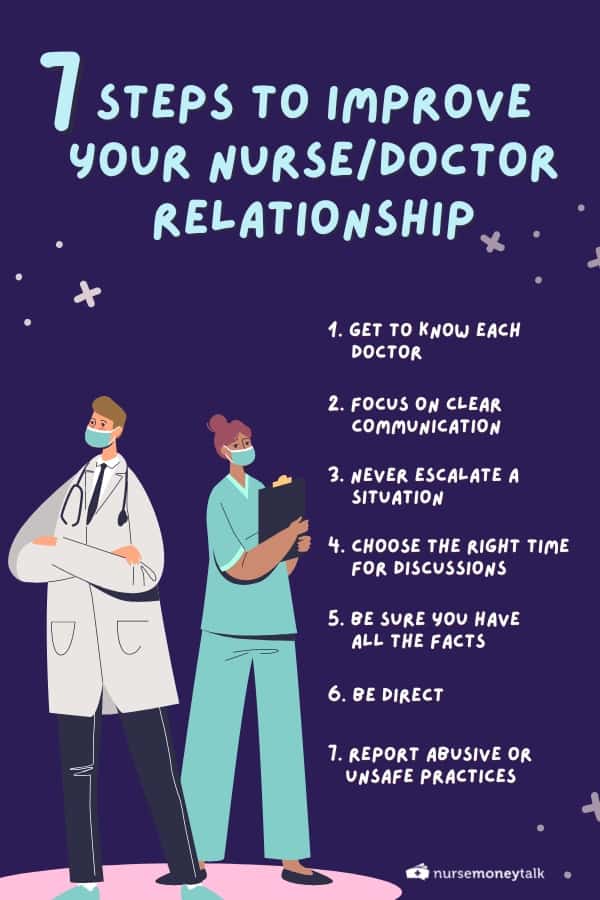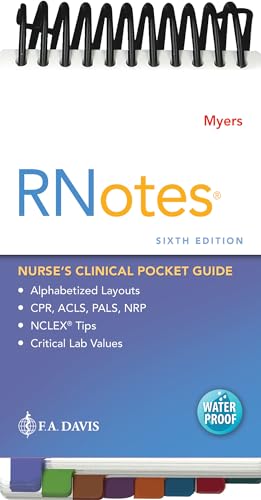As a nurse, you are a vital part of coordinating patient care with the entire interdisciplinary team.
While some individuals or departments are a breeze to work with, you will quickly find that some of your thorniest professional relationships will most likely be with doctors.
How to Deal with Difficult Doctors
To ease the discomfort of working with difficult doctors, you can employ a range of social, communicative and nursing skills that will help both of you see eye to eye.
You must also understand how to set the correct boundaries to protect yourself and know when it may be time to involve someone else.
What You Need to Create a Safe, Collaborative Work Environment
The most important items that you need to improve your working relationship with a difficult doctor are your genuine personality and your communication skills.
This process may also require time as strong, healthy relationships are never born overnight.
In addition, if a doctor ever puts you in an unsafe position or crosses the personal or professional boundaries that you have, you will need the help of your nurse manager or human resources department.
While those intangible things should be first in your nurse and doctor relationship arsenal, you may also want to arm yourself with some tangible items that will help you organize your thoughts, stay calm and follow the appropriate steps when communicating.
For example, difficult doctors do not like to take extra time as a nurse tries to remember clinical values.
RNotes: Nurse’s Clinical Pocket Guide is the perfect reference tool for immediately checking laboratory values, CPR guidelines, emergency drug dosages and more.
- Myers RN BSN, Ehren (Author)
- English (Publication Language)
- 264 Pages – 09/13/2022 (Publication Date) – F.A. Davis Company (Publisher)
When you are on the spot, these memorized values may fly out of your mind, but a quick flip through this guide will help you answer doctors’ questions easily.
If you are working on a busy medical/surgical floor or anywhere else where you must keep your notes and instructions for multiple patients well-organized, a Medical Rounds Notebook will keep vital information about each of your patients, their current medications, plans of care and doctors’ order at your fingertips.
- CREATED BY PROFESSIONALS: Our proRound Medical Rounds Notebook was thoughtfully designed by top…
- POCKET SIZED: The proRound spiral medical rounding notebook measures 4.5” x 7” to perfectly fit…
- PRE-FILLED TEMPLATE: Each page is designed with a standard template with room for specific patient…
With this guide, you will not have to worry about forgetting important concerns during rounds and will be able to answer doctors’ questions quickly.
Top Seven Steps to Improve Your Nurse/Doctor Relationship

1. Get to Know Each Doctor
Sometimes the most difficult doctors to deal with are those who are new to you either because you are working in a new unit or because they were more recently hired by your facility.
It seems that every doctor has a different way of doing rounds, asking questions and writing orders; and it can take some time for both of you to get on the same page as you work together.
For example, if you have routinely worked with doctors who do not want to know every detail about their patients during nights or weekends and instead trust you to handle most minor concerns, you may be surprised and offended by how a more micromanaging doctor treats you.
Therefore, try to get to know each doctor’s preferences quickly to avoid unhappy calls during a night shift or misunderstandings regarding patient priorities.
It may also be helpful to connect with certain doctors you work with the most on subjects other than their patients if you have the time and if it seems appropriate.
For example, among the many doctors and surgeons I worked with in the intensive care unit, some liked to chat about their hobbies or families.
Being able to chat more casually at times can make both of you seem more human and less like enemies of each other.
2. Focus on Clear Communication
When it is time to share pertinent patient data or concerns you have, it is important to know what you need to tell the doctor, in what order you should say it and how to convey any problems as clearly yet completely as possible.
Many doctors are constantly on the run and do not have time to wait as you gather your thoughts. Others may be asleep when you call for a patient emergency and do not want to waste their time trying to understand your jumbled thoughts as they are awakening.
Simply making a quick list of items to cover with the doctor along with relevant patient values can help any telephone call or in-person check-in go smoothly and decrease the chance of ruffled feathers.
The video below will help you with those incredibly challenging and sometimes scary telephone reports.
3. Never Escalate a Situation Unnecessarily
It can be easy to want to stand up for yourself if a doctor is falsely accusing you or getting after you for a minor mistake in front of your cohorts or even your patient.
However, choosing the best place and time to address your feelings about this type of scenario can decrease the chance of escalating the disagreement further.
Most likely, a doctor who is rude or angry only occasionally is simply having an unusually bad or stressful day, and the situation may clear up on its own.
However, be on the lookout for doctors who routinely mistreat or badmouth you as they may be the ones you need to address with the help of nursing leadership.
The video below can help you learn a variety of de-escalation skills that you can use in both your professional and your personal life.
4. Choose the Right Time for Discussions
Once you have a bit of experience on your nursing floor or in your department, you should get used to the typical schedule for doctor rounds and patient assessments.
Try to be accessible when your patient’s doctor is doing rounds so that you can hear the doctor and patient discussion and chat with the physician yourself.
For non-emergency discussions with a doctor, try to find a time when the doctor has time to listen and is not about to go home. Simply timing conversations well can take a great deal of stress off you.
5. Be Sure You Have All the Facts
One of the most uncomfortable telephone calls you can make as a nurse is one to a physician who is fast asleep at home in the middle of the night.
The stress is only exacerbated if the doctor begins asking you questions for which you have no answer, such as recent laboratory values, specific patient symptoms and medications that have recently been given.
I certainly know just how uncomfortable these nighttime calls can be as I have spent much of my nursing practice working overnight shifts.
Have the patient’s chart open in front of you when you make the call, and make sure that all recent values and medications have been documented before making the call to prevent embarrassment on your part and anger on the part of the sleepy doctor.
The video below gives an excellent idea of how to make a call to a physician as clear as possible.
6. Be Direct
Although it can be scary the first time or two that you have to talk to a physician, especially if you are naturally shy, it is vital that you are direct and professional in all that you say.
Do not beat around the bush with patient facts or with your recommendation if you have one. Answer the doctor’s questions quickly and succinctly.
In the same way, you must be direct with a doctor who is crossing your boundaries.
Abusive conversations that mock who you are as a person or put you down rudely are not appropriate.
Of course, physical abuse is never appropriate although that is much more rare.
However, I have seen a very angry surgeon throw a patient chart on a particularly stressful morning, so it can happen.
If your boundaries are crossed, be direct about saying so, and politely request the doctor not to repeat the disrespectful behavior.
7. Report Abusive or Unsafe Practices
Should a situation truly get out of hand or if disrespectful speech continues after you directly yet politely confront a difficult doctor, it may be time to get other healthcare leaders involved.
It is not appropriate for you to spread complaints about a doctor to all of your coworkers, but it is appropriate to talk to your direct manager who may advise you to go even further up the chain of command or to human resources.
Certain types of abusive behavior, such as sexual or physical assault, may need to be documented or reported to police.
Finding a Safe and Collaborative Nursing Environment
These steps should give you the courage to improve your relationship with any difficult doctors rather than letting them trample over your boundaries.
However, if you need to look for a new position in a more collaborative environment, check our job board for one that suits your interests and experience.
Have You Read These Yet?
- How to Deal with Difficult Nurses at Work
- How to Give a Good Nursing Handoff Report
- Reasons Nurses Are Leaving the Bedside
- Do I Have to Work in a Hospital As a New Nurse?


